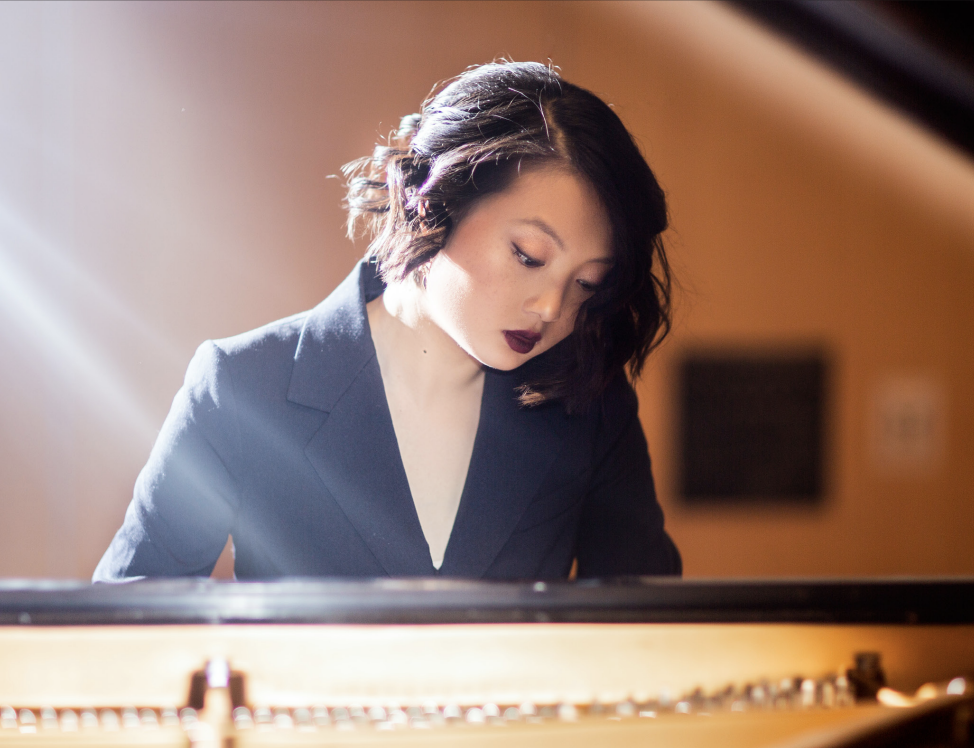Musician perseveres through injury for award-winning performance

Angelina Gibson took her seat in her long turquoise gown at the grand piano on Hamre’s stage. In the crowd sat her mom, a professional musician herself, and her instructor, Shu Li. The Concerto Aria competition judges looked on. As her fingers settled on the ivories, she exhaled. “Play it for the people you love,” she thought. By the time her hands had finished coaxing melodic emotion from Schuman’s concerto, she’d given what she described as the best performance of her life — and she became one of the winners.
“It was the first time I enacted that new philosophy,” Gibson said. “This is such an emotional piece.”
The Augustana student’s emotional and technical skill on the piano connects with her interdisciplinary interests — religion, dance, art, history, writing — to shape the way she interacts with the world.
Just six months before this Concerto Aria audition, Gibson had fallen off a bike. The fall left her with a fractured, dislocated pinkie and an injured wrist. Fixed up with a surgery, arm brace and a sling, the pianist couldn’t play for months.
“It was probably my worst nightmare,” Gibson said. “All of a sudden I was looking, I was like ‘I think my career’s gonna end.’ Yeah, I was really scared.”
With her muscles still recovering, she played her first concert since the accident in November. Then, her mind caught onto the Concerto Aria competition, which this year was for a performance with the orchestra of Schumann’s concerto. The expressive, intricate repertoire was one Gibson had wanted the opportunity to play for years.
“I decided this was probably my last time to play this concerto that I’ve been wanting to play for no less than five years,” Gibson said.
She committed to practicing 3-5 hours a day, and even with the time crunch, she passed the prescreening, won the competition and will be performing the concerto with the orchestra May 15, along with the two other winners, seniors Dylan Larsen and Rebecca Grommesh.
“Her technical ability, which means her mechanism, is wonderful,” Li said. “Also, she’s passionate about the music because she’s very natural for piano.”
Gibson grew up in music, whether playing with toys backstage while the symphony rehearsed or performing in the cruise ship talent show. Her mom, Beverly Gibson, is a professor at Dordt and Northwestern Universities and plays the clarinet professionally, including in the South Dakota Symphony. Her dad, Bill Gibson is a jazz trombonist who worked on cruise ships. Gibson started piano lessons at six through the Augustana prep program because she and her parents knew it would be useful in her pursuit of music, whether that be in her interest in theater or dance.
With a new instructor, Gibson decided to get serious about piano at 12. Her mom brought her to music stores and churches to practice when the instructor insisted she practice on a grand piano 2-4 hours a day. Finally, when they realized Gibson was truly serious about her piano playing, they bought her her own.
“I wouldn’t say it came any easier to her than anybody else, it was just that she was willing to work for these teachers that she had,” Beverly Gibson said.
Shortly after, during Gibson’s middle school years, daughter and mother performed together for the first time at Gibson’s winter recital. They performed the third movement of Mozart’s “Kegelstatt Trio, k. 498” with Gibson on the piano, Beverly Gibson on the clarinet, and a high school student on viola at the Washington Pavilion.
This mother and daughter moment also signaled the beginning of Gibson’s love for small group chamber music. She remembered learning to adjust for delayed sound from viola or breaths from clarinet as she performed.
“You see the introversion in everyday life, but when she gets on a stage, whether it’s dance or piano, suddenly there’s this magnetism that happens with the audience,” Beverly Gibson said.
Her dad’s cruise music meant travel for the Gibsons. Gibson and her mom would often fly to London and get on the ship with her dad. It took them everywhere — Russia or Turkey or the Mediterranean. She felt the European appreciation for classical music when she visited the landscapes that inspired composers and the houses where they wrote. Music followed her across the world to Estonia, where she and her mom were pulled into folk dancing at a festival.
“It was just a profound experience of ‘Oh my gosh, they speak similar languages, and we as Westerners get to learn so much more from these people about what music can do and how it can function,’” Gibson said.
That global interest has carried through to her studies here, where she’s a religion, English and music triple major. Music links every area of her involvement here.
As founder, president and choreographer of the Arti Tanzer dance project, Gibson can read music to get a sense of the fitting choreography. She also said that dancers move differently if they are musicians.
The School of Music has also accommodated the piano major’s wide area of interest with her participation in the Augustana Band, the orchestra and the Angelus choir.
Gibson said after she graduates May 2023 she plans to become a professor in music history by getting her doctorate in musicology — analytically studying music. As a professor, she looks forward to playing the pieces of music she’s teaching her students about.
“It means a lot more, as a historian, to actually be able to play what you’re talking about,” Gibson said. “It’s way more impactful for a student body.”
After years of interdisciplinary study, competition and technical training, Gibson said she’s only recently reframed her mindset to playing for others instead of to compete. She added that when she plays for those she loves, that’s when she plays her best.
That’s how she performed her audition in February, and that’s how she’s looking to approach the Concerto Aria concert in May.



